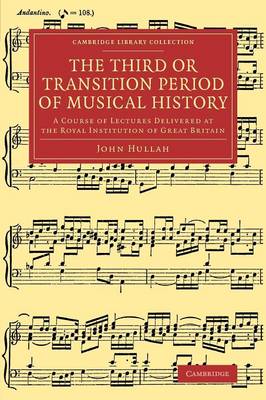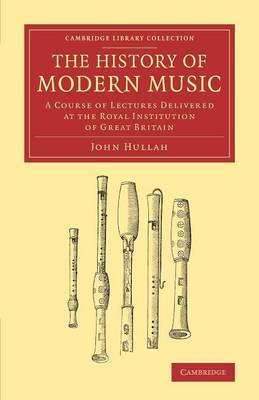Cambridge Library Collection - Music
3 total works
The composer and music teacher John Pyke Hullah (1812-84) enjoyed considerable success with The Village Coquettes, his 1836 opera with a libretto by Charles Dickens. He is best remembered, however, for his 'singing school for schoolmasters' which he directed at London's Exeter Hall in the 1840s and later at the specially built St Martin's Hall. Although his use of the French fixed sol-fa system was quickly superseded by Curwen's tonic sol-fa approach, his efforts - with the support of Sir James Kay-Shuttleworth - embedded music firmly in the school curriculum. An influence on the rapid growth of British amateur choral societies, he was also appointed the first government inspector of music in training colleges in 1872. First published in 1886, this biography was prepared from Hullah's notes by his second wife, Frances Rosser Hullah (1839-c.1921), a professional sculptor and writer on music for women's periodicals.
The music teacher and composer John Pyke Hullah (1812-84) is best remembered for his 'singing school for schoolmasters'. Through his dedicated efforts music was embedded into the school curriculum, and his inspiration influenced the rapid growth of amateur choral societies in Britain. Professor of vocal music at King's College, London, from 1844 to 1874, Hullah was elected to the committee of management of the Royal Academy of Music in 1869 and in 1872 became the first government inspector of music in teacher training colleges. The work reissued here is the second edition, published in 1876, of lectures given at the Royal Institution in 1865 on the topic of Italian, French, German and English music from the Renaissance to Handel. It expands on part of his overarching 1861 course of lectures, The History of Modern Music, which is also reissued in this series.
The music teacher and composer John Pyke Hullah (1812-84) is best remembered for his 'singing school for schoolmasters'. Through his dedicated efforts music was embedded into the school curriculum, and his inspiration influenced the rapid growth of amateur choral societies in Britain. Professor of vocal music at King's College, London, from 1844 to 1874, Hullah was elected to the committee of management of the Royal Academy of Music in 1869 and in 1872 became the first government inspector of music in teacher training colleges. Published in 1862, this accessible history of music from plainsong to the mid-nineteenth century, which Hullah divided into four periods, was first given as a course of six lectures at the Royal Institution in 1861. A further series of lectures, The Third or Transition Period of Musical History, is also reissued in this series in its 1876 second edition.


